Ari
April 12, 2017
Episode 76 – TOS 3×21: “The Cloud Minders”
Now in our home stretch for The Original Series, we come to a genuinely kinda good late-series episode, in which the Enterprise gets caught in the middle of a civil rights struggle that not-at-all-subtly mirrors the American civil rights movement, but in a floating cloud city.

Federation member planet Ardana has a special mineral that happens to be the only thing that can stop a “botanical plague” on another Federation member planet. There’s a ticking clock, of course; they have maybe a day to get this done, or billions will die. So naturally, Ardana’s rebel faction of oppressed mole people (we here at NSMTNZ have a solid “never trust a mole person” policy but arguably they are wearing sunglasses and therefore not mole people) chooses right now to throw a wrench into the works.
So, on Ardana (which, given its deeply ingrained class stratification probably should never have been allowed to join the Federation in the first place??), those who enjoy the benefits of labour (city-dwellers) are separated from those who do the work (Troglytes). And my “separated,” I mean the wealthy elite live in a literal floating cloud city and the working poor are confined to the mines on the surface, where a gas given off by the planet’s only industry causes brain damage that the cloud people use to justify their oppression of the miners because they’re “mentally inferior.”

Yeah, late Original Trek was not at all subtle in its criticism of institutionalized inequality. After all, cancellation was only four episodes out at this point.
There is some really amazing dialogue in this episode! We even get to see aliens talking to each other about their own cultural issues, which is bafflingly rare in TOS despite its explicit focus on, y’know, addressing cultural issues. There are some genuinely moving speeches about privilege and internalized -isms and racial bias in medicine and the cognitive dissonance necessary for casual oppressors and even some conversations that might qualify as proto-intersectional. There’s a lot of criticism of anti-intellectualism and some straight-up championing of socialist policies that would have been pretty damn risky at the time this was airing. It is one of the most self-aware episodes of Trek we’ve seen yet.

In the end, Kirk, driven to the edge of reason by both sides refusing to actually reason, ends up solving the problem through creative kidnapping. But since he mainly only really endangered himself, and did it for the purpose of saving an entire other planet who didn’t ask for any of this, and also because it’s a plan that Jean-Luc Picard would have absolutely co-signed and rewarded with a bottle of wine, we’re going to give him a pass.
Podcast: Play in new window | Download | Embed
Subscribe: Apple Podcasts | Email | RSS
Ari
April 5, 2017
Episode 75 – TOS 3×20: “The Way to Eden”
So this week’s episode is about checking your privilege!
The Enterprise trips over a stolen ship full of young space hippies who have fled the oppressive embrace of socialist Federation utopia, where all their needs and desires were met for free, to… start a commune in the desert.
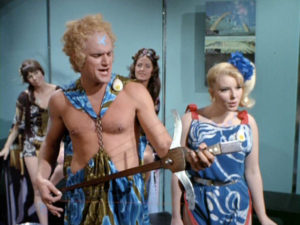
Sound familiar? I mean, no, this isn’t about the Manson Family – the episode predates the most sensationalized event in Manson Family history by something like a year – but it’s definitely saying something about middle-class kids who ran away to Los Angeles in the 1960s and fell under the sway of acid-peddling “gurus” and their ilk. In the real world, these kids largely got lied to, taken advantage of, and sometimes, uh, dead of various preventable diseases. In this case, the desert commune is the never-explained mythical “Eden,” and the part of the guru is played by a cauliflower-eared anti-vax douchebag who is knowingly exposing unprotected people to his deadly, drug-resistant space syphilis, something he’s sure the Eden “primitives” can cure him of, with their “pure” and “simple” lifestyle (ah yes, the racist cherry on top).

Maybe it’s just that we’re all old, but nearly everything about the space hippies was infuriating. Their complaints about the oppressive society they’re fleeing ring somewhat less than true, since nearly all of them come from hyper-socialist 23rd-century Earth. Their leader’s ulterior motives are totally self-serving, to literally no one’s surprise.
And they hate technology, saying it’s taken us too far from our roots/nature/oneness/that high they’ve been chasing since undergrad, I guess? Now I, personally, am sent into a towering rage by luddism (there is nothing romantic about the past, the past sucked), but even I would have been totally fine with these space idiots jetting off to die in deep space if they hadn’t initiated their grand quest by straight-up stealing someone else’s space ship, which they then proceed to drive straight into Romulan space, risking interstellar war and the deaths of billions of innocent people, but who cares, right? They have a destiny! It’ll all work out!
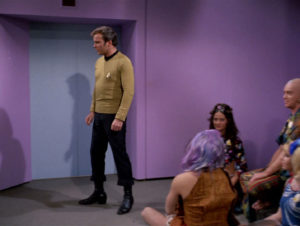
In the end, it turns out that beautiful, unspoiled Destination Eden was a sham all along – worse, it’s a poison planet where literally everything is made of ultra-corrosive acid. Two space-hippies, including Leader D-Bag, gets exactly what a real life in the fake-idyllic pre-technology past will get you: an existence that is nasty, brutish, and short.
Podcast: Play in new window | Download | Embed
Subscribe: Apple Podcasts | Email | RSS
Ari
March 29, 2017
Episode 74 – TOS 3×19: “Requiem for Methuselah”
So I nearly didn’t bother writing a post for this episode, because Corene’s intro basically… covers it all.
You’ll see.
But essentially this week’s story is a lecture on why no one, especially white dudes, should actually be immortal. It’s bad for everyone. You, your family, your friends, passing starships, the super-intelligent robot daughter you built in a lab…

Summary: the Enterprise crew (through yet another catastrophic failure of standard biohazard protocols and vaccine management) has fallen ill with a terrible space-fever that will kill everyone within four hours unless they track down a source of magic space rock to make anti-toxin. Is it a bacteria? A virus? Poison? Who cares! Certainly no one who wrote this episode, because it’s all just a contrivance to get them to beam down to this guy’s planet.
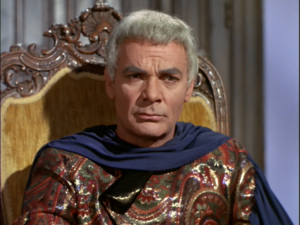
Yes, you heard that right. This guy – Flint, by name – owns his own planet. Yeah, I’m looking forward to 24th-century star trek where they’ve worked out the whole socialist-Earth-people-confused-by-space-capitalism system to a point where there’s any kind of internal consistency, but for the purposes of this episode, he purchased the planet through shady means and a fake ID and btw is also 6,000 years old. He’s also got a castle full of antiques – that are not antiques because they’re all brand new – that he may or may not have sculpted, painted, and written himself.
We couldn’t decide whether the most irritating part of this was the fact that some Gary Stu writer on the staff seized the opportunity to cram this character full with every single Highlander-esque storyline that ever passed through his head but mostly failed to imbue the man with a pathos score of greater than 17%, because it turns out that this dude was the secret identity of every interesting historical figure, from Shakespeare to Brahms to Da Vinci to Alexander the Great, but still hasn’t worked out that treating people like things is Not Okay.
Instead, he’s spent his entire tenure on Planet Asshole trying to build himself the perfect daughter-slash-girlfriend.
Yeah, it’s… unclear. Rayna is introduced as a member of Flint’s family, and everything we see between them pre-robot reveal makes it super, super clear that Rayna considers him a father. In fact, Flint says he raised her from infancy. But then suddenly, when her neural net wakes up upon exposure to Kirk’s devil-may-care smile and she realizes that feelings are a thing, Flint’s all: “sweet, let’s get married and live together forever as man and wife.” It’s… jarring, at best. Creepy, at worst. And Kirk’s behaviour is not much better; it appears that robot with feelings is enough to drive everyone out of their damn minds.

This episode is supposed to be about how sad it is that some old dude has outlived everyone he ever loved and was therefore, somehow, driven to exploit and mistreat and discard everyone he meets from then on. But surprisingly, we don’t really care about Flint’s manpain! Rayna’s story is much more interesting, though it’s not given nearly enough attention in-story. Somewhere in here, there’s a genuinely interesting conversation about self-determination: what makes one human, and whether or not human rights apply to artificial life, and the importance of free will to the nature of humanity, but, let’s be serious: it’s a conversation that’s better approached, contextualized, and executed, in every possible way, by later franchises, basically from the introduction of Soong-type androids like Data. In fact, there’s a Next Gen episode with a similar internal plot to this, and one that treats the subject with far more intelligence and sensitivity.
Also at no point in the TNG episode does it become necessary for anyone to explain that no, it’s probably never cool to put the moves on your wards, even the ones you built in a lab.
Podcast: Play in new window | Download | Embed
Subscribe: Apple Podcasts | Email | RSS
Ari
March 22, 2017
Episode 73 – TOS 3×18: “The Lights of Zetar”
In this episode, in a roundabout treatise on bodily autonomy and how you shouldn’t fuck with it, some jerkface glowy space lights impersonate The Patriarchy.
(Poor, poor) Mira Romaine, Space Archivist, is on board the Enterprise to install new equipment on Memory Alpha, the Federation’s cultural repository. So, space library/archive, basically. We love this idea, even though its practicality is highly limited due to having been conceived of in an age before network connectivity or automatic quadruple backups and therefore about as vulnerable as the Library of Alexandria. Spoiler: things end about as well for Memory Alpha.

The Enterprise runs into the Patriarchy Lights (aka: the titular Lights of Zetar) on their way there and a bunch of people get weird headaches, but Lieutenant Mira Romaine gets first-stage possessed by the Lights and starts having visions.
So, this sounds interesting. Right? Except the show completely drops the ball.
Mostly Romaine is unnecessary to this episode, because despite being written by a woman (though we’re inclined to blame dude-rewrites) – Shari Lewis, to be specific! – this episode, that is nominally about a woman’s bodily autonomy, consists mainly of a bunch of men, including male-voiced incorporeal-douchebag space-lights (oh look, it’s another exciting episode of You Literally Cannot Trust Ascended Beings) standing around arguing about the woman’s rights while the woman in question writhes, incapacitated in one way or another, in a corner.
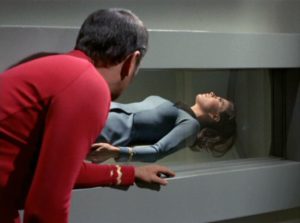
The Lights want to take over Romaine’s body, and keep it until it dies. Romaine, obviously, is seriously fucking opposed to this (we think – she doesn’t get many lines). The dudes in her life (including an inexplicably-besotted Scotty who takes their unconvincingly-portrayed budding relationship as license to speak for Mira, condescend to Mira over things that turn out to be very fucking real and important after all, and make decisions for her) are like, philosophically opposed to and argue against this and are even willing to straight-up kill in order to prevent it, but at no point actually ask Mira what she wants.
Worse, nearly the entire episode is actually told not from Mira’s point of view, but from Scotty’s. And Scotty spends the first half of the episode trying to reverse-gaslight Romaine out of reporting her weird visions, or believing anything is seriously wrong with her.
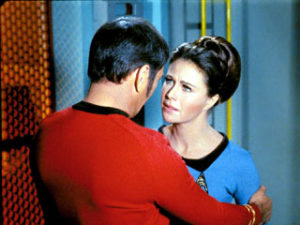
Basically with a few tweaks here and there – completely excise the weird romance sideplot, give Mira 75% more dialogue and a refocusing of the story on Mira’s POV – this could have been a great episode. As it is, the NSMTNZ crew can award it no better than a “meh.”
Podcast: Play in new window | Download | Embed
Subscribe: Apple Podcasts | Email | RSS
Ari
March 15, 2017
Episode 72 – TOS 3×17: “That Which Survives”
Buckle up, nerds, because this week’s episode brings together two of our favourite things: 1. Star Trek and 2. a cozy murder mystery! We’re so excited.
(Okay, 2/3 of us are excited. But Kim was loudly overruled because DEMOCRACY.)
There’s no contrived excuse for tossing our crew into the mystery this time: it’s a straight-up scientific investigation of a weird planet that shouldn’t exist in nature. Hallucination? Artificial planet? Sensor ghosts? Actual ghosts? But Kirk decides the most sensible method of investigation is to actually beam down.
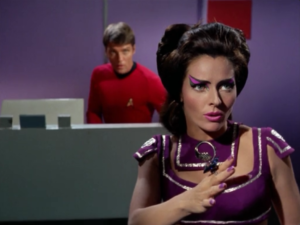
That’s maybe his moment of most questionable judgement in the episode (as evidenced by the Ghost of Purple Space Christmas Past popping on board to scream a too-late warning), but we want to give points from then on. A TOS episode in which nearly everyone, nearly all of the time, thinks things through before acting? In which we not only make verbal callbacks to previous episodes, but learn the lessons of previous failures? Impossible!
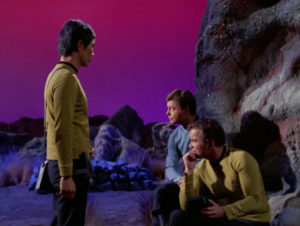
There’s a weird through-running series of out-of-place “oh, she’s killing us one by one but she’s soooooo beeeeeeoooooootifulllll” comments by the male characters, but… it actually turns out to make relevant sense, in a kind of subversive, roundabout kind of way. It took us most of the ep to work this out, and we’re really really mad about it.
This is actually a really enjoyable episode, given that not all that much happens? There’s a murder mystery; there’s a cultural puzzle to be solved; there’s a lot of problem-solving that requires extensive use of logic and deduction; there’s a plethora of crisis-reaction shots which are mainly women; there’s Lee Merriweather aka Catwoman as our female guest star! There’s a character clearly intended to be Indian who was played by a Jewish-American actress which really threw our POC count into a tizzy but we decided to come down on the side of who does a hell of a lot of out-loud problem-solving in a command position on the bridge of the Enterprise. Like, there are some weird, potentially-problematic bits of the type and in roughly the proportions we have come to expect them from TOS, but for the most part, it is good?

Strange. Confusing. Surprising. Especially given the magnificent insanity of this outfit.
Podcast: Play in new window | Download | Embed
Subscribe: Apple Podcasts | Email | RSS
Ari
March 8, 2017
Episode 71 – TOS 3×16: “The Mark of Gideon”
This week brings us to an episode is often referenced as evidence of Trek’s pro-choice, feminist foundations. The basics are thus: Kirk gets kidnapped by the government of Gideon, subjected to involuntary medical experiments in order to extract a disease from his blood, which is then given to a young woman who has apparently volunteered to be infected, and to die, in order to inspire others on Gideon to volunteer for suicide so that they may finally address their planet’s hideous overpopulation problem.
If this sounds like a flat-out insane way of dealing with overpopulation, you’re not alone! Kirk is also horrified, not only by the brutality of their methods but by the fact that this entire planet would rather subject themselves to horrible painful death by disease than, like, slow down with the baby-making.
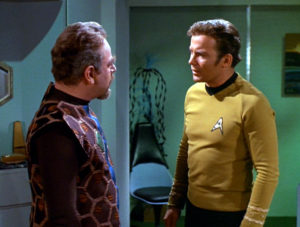
If you haven’t seen the episode before, you’ve probably seen it giffed, during the scene where Kirk pleads with the leaders of Gideon (all white men, naturally) to consider, y’know, contraception to solve their world’s catastrophic overpopulation problem, rather than killing a young woman in the interest of preserving future, potential life. Because everyone knows women are just vessels for potential male babies! The episode is… not subtle.
…so here is where I intended to include a video of the famous scene where Kirk tries to convince the Boss of Gideon to accept the Federation’s help with introducing birth control to their civilization and directly links Gideon’s claims of “loving life” and the hypocrisy of being nevertheless prepared to straight-up murder a young woman in the interest of that goal to contemporary controversies about women’s bodily autonomy and the inherent hypocrisy and misogyny of the right-wing “pro-life” movement, but some things happened when I went looking for one:
- In the time that I had, I couldn’t find a video that didn’t cut off right before Kirk’s most important line, which stabs Gideon’s murderous hypocrisy right in its heart: “But you can kill a young girl?” It’s the most important line of the scene??
- I got mad over the number of reviews I found, published not in the 1960s but in this century, whining about how the social commentary “ruined a perfectly good episode,” because apparently these dudes do not understand Star Trek at all.
- In case you’re confused, So-Called Internet Trekkies, here is a reminder:

So here, have a picture of Odona’s totally bananas outfit instead:
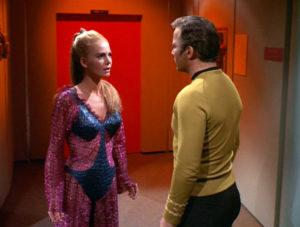
Anyway, I don’t disagree that the incredibly-forced, last-minute love story between Kirk and Odona was unnecessary and weird, but there’s a really interesting message in here, about bodily autonomy (the real issue behind the pro-choice and anti-choice debate), and it’s one that’s applied both to Kirk and the female guest-star. Kirk is violated, one might even argue more directly than Odona is, because at least Odona technically gets to choose her fate, though one could also argue that her violation is more subtle, in that it’s being done by her entire society. Like, ignore the awkward makeouts, and the, uh, somewhat contradictory resolution chosen by Kirk, and you still have a story that was pretty revolutionary for its time.
Podcast: Play in new window | Download | Embed
Subscribe: Apple Podcasts | Email | RSS
Ari
March 1, 2017
No episode this week!
Sorry, folks – a plague has descended upon our household, leaving one of your hosts more or less voiceless and throwing off our entire schedule. We’ll be back next week!
Ari
February 22, 2017
Episode 70 – TOS 3×15: “Let That Be Your Last Battlefield”
So this episode needs little explanation, being well-known, even to those living under literal rocks, as Trek’s Clumsiest Racial Prejudice Metaphor, but just in case you were unsure about where we were, here’s a reminder:
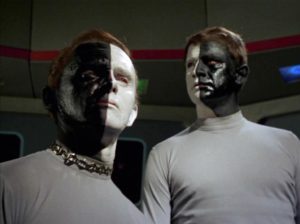
This episode gets a score of slightly below 50% for, okay, explicitly tackling an extremely controversial, extremely relevant issue of the day, but, uh, totally blowing everything by implying that the faults on both sides are equal. I mean, we’re sure the censors of the day played a role in swaying the message in a more “level” direction, but it would have gotten a better score if the episode had spent slightly more time on driving home Genocide Is Morally Indefensible Regardless of the Circumstances versus handwaving via Oh Well It’s All Descended Into Chaos Now We Are All at Fault. Let’s be clear, kids: genocide and activism against genocide are not morally equivalent.
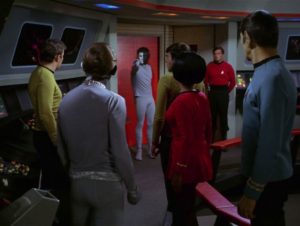
Basically this whole episode boils down into a pretty toothless object lesson about how hate is bad, hate just ends in death and destruction and extinction and rational beings descending into unending violence, which okay, sounds very Star Trek, but I guess our standards have been ruined by Jean-Luc Picard’s much more sensitive and intelligent take on things as they hover over the burning, lifeless planet Cheron.

Although in fairness, I can easily imagine all the later captains taking one last look at these two assholes who decided that the last thing they wanted to do with their existence as the final two members of their species was to chase each other through the smoldering corpse of their dead homeworld, and peacing out back to Earth, like Kirk does, though I like to imagine JLP would have given us a better speech than Spock’s boiling-down to the fact that “extreme viewpoints are illogical,” because okay, yeah, but guys? Genocide. Gen-o-cide. Jeez.
Podcast: Play in new window | Download | Embed
Subscribe: Apple Podcasts | Email | RSS
Ari
February 15, 2017
Episode 69 – TOS 3×14: “Whom Gods Destroy”
So, chances are, you have a hazy memory of a Star Trek episode that takes place in a mental hospital of some kind. Like us, you probably made it to Dagger of the Mind and went “wait, what? why is this way worse than I remember, and not just because it’s been twenty years since I last saw it?” Well, I’m about to put your mind at ease, because it turns out that there are, in fact, two Original Series episodes that a) take place in a mental health facility and b) talk about mental illness in a surprisingly sympathetic and progressive way, e.g. It Is An Illness, and this is the second one. The do-over, if you will, given that their actual plots are really, really similar. And spoiler: this one’s a lot better.
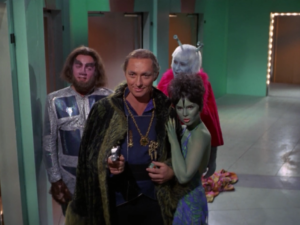
The Enterprise visits the Elba 2 asylum (a facility for the “incorrigibly criminally insane” deemed incurable by other medical means) to deliver a new wonder drug that Federation scientists hope will provide the cure to all mental illness… or at least, that’s the idea, broadly speaking. Kirk and Spock beam down to deliver the vials and learn that one of Kirk’s heroes, Captain Garth, aka: Garth of Izar, is now an inmate at the hospital. Because apparently no one’s ever told him that you should never meet your heroes (seriously, specifically in Kirk’s case – it never goes well), he asks the Governor if he can see Garth.
Naturally, it’s about two minutes later that we learn that Garth has replaced Governor Corey, taken over the asylum, developed an ultra-explosive capable of destroying planets, and has grand plans to take over the galaxy because the extinction of war as a way of life has made humans weak and robbed them of purpose. Oh, and by the way, Garth has developed shapeshifting powers that allow him to look like anyone he wants. Guess who his new favourite shape turns out to be.
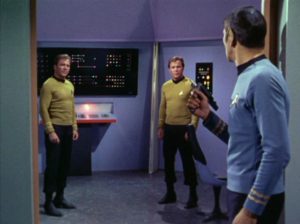
Kirk is absolutely opposed to this entire way of thinking, and he says so, a lot. Peace, Kirk says, gave him purpose. Peace brought prosperity to the galaxy. Peace made Kirk and Spock brothers. Peace – and compassion, and friendship – are the way forward, into the future.
If this refrain sounds familiar to those of you who’ve seen and liked the thesis statement of Star Trek: Beyond, you’re not alone. And this episode deals with similar themes, enough that we saw direct connections between Whom Gods Destroy and the reboot film. Garth, despite his clear Napoleonic roots, is a sympathetic character. Kirk, while trying to argue him out of the whole galactic domination thing, repeatedly tells Garth that what he’s doing is wrong, but that it’s not his fault: that he’s sick, and that what’s happening isn’t his fault. You could brush this off as coming from Kirk’s clear affection for the man’s legacy, but it’s also obviously rooted in a culture that has gone a long way in destigmatizing mental illness. Garth, we’re told over and over again, is not his mental illness. Garth’s not crazy, he’s sick, and Kirk wants to help him.
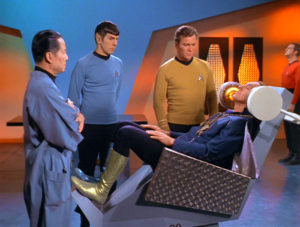
These are all attitudes we rarely see convincingly portrayed in twenty-first century television, and moreover, it’s strongly implied that a life of war and its associated trauma may have caused Garth’s mental illness in the first place, long before an accident maimed him and led to his developing superpowers. In the end, the message of this episode is larger than our oft-repeated “safe words save lives.” It’s about compassion, and about how friendship is, really, kinda magic.
Podcast: Play in new window | Download | Embed
Subscribe: Apple Podcasts | Email | RSS
Ari
February 8, 2017
Episode 68 – TOS 3×13: “Elaan of Troyius”
So this week’s episode would best be described as Taming of the Shrew, But in Space, but with the caveat that in no universe would any acceptable version of Kate have tolerated the spanking threats heaped upon her counterpart by our heroic captain. If you, like us, prefer Taming of the Shrew adaptations where the nonsensical “oh you menfolk were right about everything” (basically Ten Things I Hate About You and then… okay, the list stops there), you’re likely to have the same conflicted experience with this episode that we did.
That is, one moment you’re annoyed with our female guest star for being a heinous wretch and totally feeling Kirk’s frustration, and the next you’re rooting for Elaan to stab everyone to death, take over the Enterprise, and take to the stars in a life of piracy where no one will ever force her to marry for political reasons again.
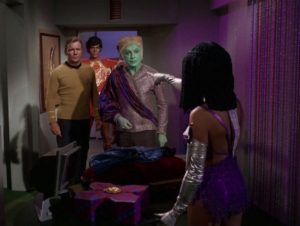
That’s not to say that this episode doesn’t have its funny moments. There are, for sure, scenes where you are right there with this young woman’s complaints about her situation, but since the show paints her as a spoiled brat (and there was definitely some discussion amid the NSMTNZ crew about how uh, she’s royalty, sacrificing personal desires for the good of the state is what royalty does; it’s how we justify allowing them to continue existing?), her reactions so utterly over-the-top, it’s difficult to maintain the ire.
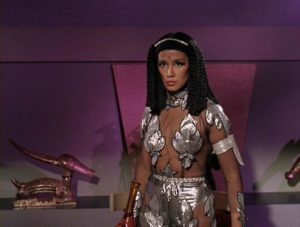
Not to mention the late introduction of romantic subplot where, after whammying him with her magic love-potion tears (uhhhhh…), Elaan immediately falls in love with Kirk and refuses to be parted from him, even though failing to carry out her arranged marriage will plunge not only her planet and their sworn enemies into war with each other, but the entire Federation into war with the Klingons.

It’s… confusing. But all that aside, France Nuyen is frankly amazing in this one, almost enough to excuse the absurd writing and characterization. So… enjoy, I guess?
Podcast: Play in new window | Download | Embed
Subscribe: Apple Podcasts | Email | RSS
